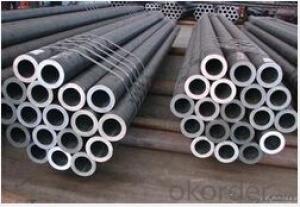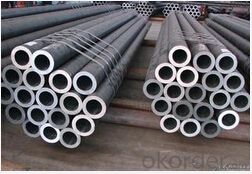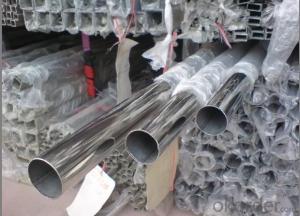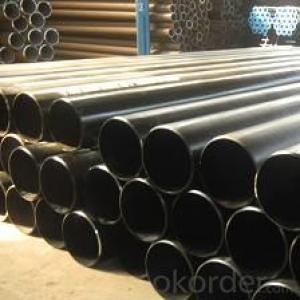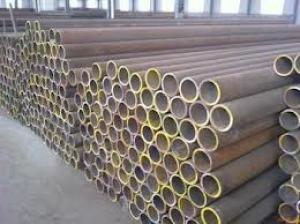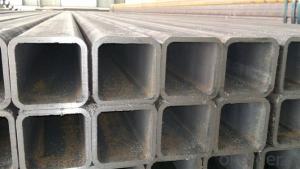Seamless steel tube for transmission of fluids
- Loading Port:
- China Main Port
- Payment Terms:
- TT OR LC
- Min Order Qty:
- -
- Supply Capability:
- -
OKorder Service Pledge
OKorder Financial Service
You Might Also Like
Standard:
GB/T8163 Chinese national standard
Application:
General seamless steel tubes for conveying fluids
Models of major steel tubes:
10.20,Q345,etc.
Diamensional tolerances:
Types of steel tubes | Outer diameter | Wall thickness | ||
Cold-rolled tubes | Tube sizes(mm) | Tolerances(mm) | Tube sizes (mm) | Tolerances(mm) |
>30~50 | ±0.3 | ≤30 | ±10% | |
>50~219 | ±0.8% | |||
Hot-rolled tubes | >219 | ±1.0% | >20 | ±10% |
Mechanical properties:
Standard codes | Models of steel tubes | Tensite strength(MPa) | Yield strength(MPa) | Elongation(%) |
GB/T8163 | 10 | 335~475 | ≥205 | ≥24 |
20 | 410~550 | ≥245 | ≥20 | |
Q345 | 490~665 | ≥325 | ≥21 |
Chemical composition:
Standard codes | Models of steel tubes | Chemical compositions(%) | |||||||
C | Si | Mn | P | S | Cr | Ni | Cu | ||
GB/T8163 | 10 | 0.07~0.14 | 0.17~0.37 | 0.35~0.65 | ≤0.035 | ≤0.035 | ≤0.15 | ≤0.25 | ≤0.25 |
20 | 0.17~0.24 | 0.17~0.37 | 0.35~0.65 | ≤0.035 | ≤0.035 | ≤0.25 | ≤0.25 | ≤0.25 | |
Q345 | 0.12~0.20 | 0.20~0.55 | 1.20~1.60 | ≤0.045 | ≤0.045 | / | / | / | |
- Q: Stainless steel tube, also known as why tube?
- Production methods can be divided into two categories: seamless pipe and welded pipeSeamless steel pipe can be divided into hot-rolled pipe, cold rolled tube, cold drawn tube and extruded tubeWelded pipe is divided into straight welded pipe and spiral welded pipe and so on
- Q: How are steel pipes insulated to prevent freezing?
- Steel pipes are insulated to prevent freezing by wrapping them with insulation materials such as foam or fiberglass, which helps to maintain the temperature of the pipe and prevents the transfer of cold air. Additionally, pipes can be buried underground below the frost line to protect them from freezing temperatures.
- Q: How are steel pipes used in the power generation sector?
- Steel pipes are commonly used in the power generation sector for various applications such as transporting steam, water, and other fluids within power plants. They are used for conveying fuel and combustion gases, as well as for cooling systems and turbine installations. Additionally, steel pipes are utilized in power plant construction for structural support and as part of the overall infrastructure.
- Q: How do steel pipes compare to other materials like PVC or copper?
- Steel pipes have several advantages over other materials like PVC or copper. Firstly, steel pipes are incredibly strong and durable. They can withstand high pressure and extreme temperatures without cracking or bending. This makes them ideal for heavy-duty applications such as industrial piping systems or underground installations. Secondly, steel pipes have excellent corrosion resistance. Unlike copper pipes that can corrode over time, steel pipes are typically coated with anti-corrosive materials such as zinc or epoxy. This protective layer prevents rust and ensures a longer lifespan for the pipes. Furthermore, steel pipes offer superior fire resistance compared to PVC or copper. They are non-combustible and can withstand high temperatures for extended periods without deforming or releasing toxic gases. This makes steel pipes a safer option for applications where fire hazards are a concern. In terms of cost, steel pipes may be more expensive than PVC initially, but they offer better long-term value due to their durability and longevity. Copper pipes, on the other hand, can be quite expensive and are susceptible to theft due to their scrap value. Lastly, steel pipes are highly versatile and can be used in various applications, including water supply, sewage systems, gas pipelines, and oil refineries. They can handle high volumes of fluid with ease and are resistant to external factors like UV rays or physical impacts. Overall, steel pipes are a reliable and efficient choice for many industries and applications, offering strength, durability, corrosion resistance, fire resistance, and versatility that sets them apart from materials like PVC or copper.
- Q: What is the difference between steel pipe and HDPE pipe?
- Steel pipe and HDPE pipe are both types of pipes used for various purposes, but they differ in their composition and characteristics. Steel pipe is made of a combination of iron and carbon, making it strong and durable. It is commonly used for transporting fluids and gases in industries such as oil and gas, construction, and water supply. On the other hand, HDPE (high-density polyethylene) pipe is made of a plastic polymer, which offers excellent flexibility and corrosion resistance. HDPE pipe is commonly used for applications such as drainage, irrigation, and sewage systems. Overall, the main difference between steel pipe and HDPE pipe lies in their material composition and the specific applications they are best suited for.
- Q: Are steel pipes suitable for underground cable protection?
- Yes, steel pipes are suitable for underground cable protection. Steel pipes provide excellent mechanical strength and durability, protecting cables from external forces such as ground movement or accidental damage. They also offer resistance to corrosion, making them a reliable choice for long-term cable protection in underground installations.
- Q: What are the different types of steel pipe bends?
- There are three main types of steel pipe bends: 90-degree bends, 45-degree bends, and 180-degree bends. These bends are commonly used in piping systems to redirect the flow of fluids or gases in a desired direction.
- Q: How are steel pipes used in the manufacturing of food processing equipment?
- Steel pipes are commonly used in the manufacturing of food processing equipment due to their durability, strength, and resistance to corrosion. These pipes are used to create a network of channels and conveyors, allowing for the efficient transportation of various food products during the manufacturing process. Additionally, steel pipes are used for the supply of water, steam, and other fluids required for food processing, ensuring a hygienic and safe production environment.
- Q: What are the different grades of steel used in pipes?
- The different grades of steel used in pipes include carbon steel, alloy steel, stainless steel, and duplex stainless steel.
- Q: Can steel pipes be used for water treatment plants?
- Yes, steel pipes can be and are commonly used in water treatment plants. Steel pipes have several advantages such as high strength, durability, and resistance to corrosion, making them suitable for conveying and transporting water in water treatment processes.
Send your message to us
Seamless steel tube for transmission of fluids
- Loading Port:
- China Main Port
- Payment Terms:
- TT OR LC
- Min Order Qty:
- -
- Supply Capability:
- -
OKorder Service Pledge
OKorder Financial Service
Similar products
Hot products
Hot Searches
Related keywords
